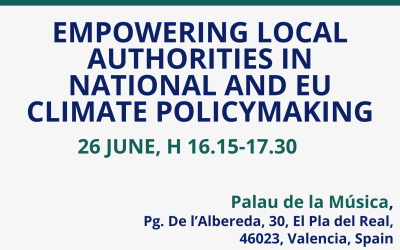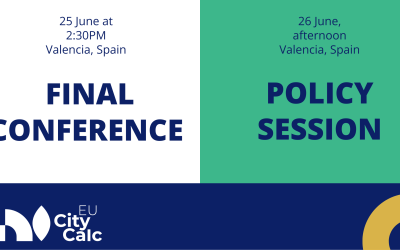EUCityCalc data can support cities in shaping the National Energy and Climate Plans to implement the green transition
Cities have enormous potential to accelerate decarbonisation and enable public participation to achieve climate neutrality. However, local authorities rely heavily on national and EU support to further unleash this capacity for action. This means that collaboration between these different administrative levels is crucial, especially when it comes to the revision of the national energy and climate plans (NECPs) because they entail a plethora of policy measures that should be implemented at a city level.
EU countries are required, through the Governance Regulation, to actively ensure public participation in the NECP drafting process. National governments need to provide “the public early and effective opportunities to participate” (Article 10) and hold “multi-level climate and energy dialogues” (Article 11). In these dialogues, city-level stakeholders have the opportunity to discuss the country’s planned scenarios.
Engagement is key: Everybody can contribute to improving climate policies
Between now and June 2024, civil society, cities, and other stakeholders can play a major role in their country’s NECP process by reviewing their country’s draft plan and suggesting recommendations for policy improvements. More concretely, EU countries need to submit to Brussels their revised draft NECPs by the end of June 2023. Thereafter, the European Commission will review the draft plans by the end of December 2023, and assess the given recommendations provided by the member states. Following this, the national governments need to submit the final version of the plans by June 2024.
It’s especially important for civil society and local stakeholders to be involved in the NECP preparation process because this did not happen adequately in the past. When NECPs were first prepared in 2018-2019, the involvement of cities was rather exceptional. Out of the six countries participating in the EUCityCalc project, only the governments of France and Latvia established an extensive engagement process. In Croatia, the Czech Republic, Italy, and Portugal, city involvement was mixed: in some cases, cities were able to participate indirectly, but in other cases the process was unclear or even non-existent.
Proactive and reactive local authorities can make the difference
Broadly, cities and regional or local authorities can engage in the NECP drafting process both reactively and proactively. Both of these approaches can be effective in different ways. A reactive strategy could include answering online consultations and participating in meetings initiated by the national government. A proactive approach could include actions like liaising with other potential allies to campaign for the inclusion of particular policies. These partners can be NGOs or umbrella groups of local authorities which coordinate a joint approach and messaging. Other proactive approaches include getting in touch with the ministry in charge of the NECP and organising discussions with multi-level stakeholders. Ideally, both reactive and proactive modes should be pursued.
EUCityCalc: Calculate engagement and foster decarbonisation
Ultimately, local authorities are among the most affected by the climate actions planned in the NECPs. It makes sense for them to play a key role in policymaking and contribute to strengthening the ambitions of those national targets. Considering this need, part of the work within the EUCityCalc project is to assist cities, and other interested local stakeholders, by empowering them to accelerate the NECP revision process and by sharing knowledge to enhance engagement. The upcoming EUCityCalc toolkit and related pathways are a significant way to showcase city-level initiatives that foster decarbonisation, while conveying where national and EU-level support is required, so that local governments can implement their climate and energy plans.











